Should we raucously celebrate a football win in a pandemic?
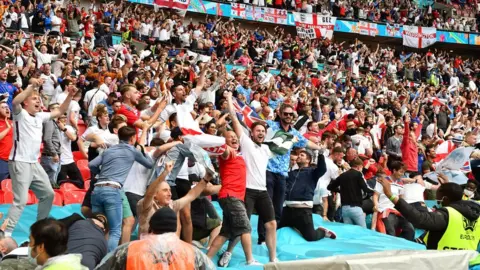 EPA
EPAImages of England fans celebrating the Euro 2020 win over Germany have been all over the media this week - scenes of celebration and gatherings in large numbers we have not really seen the like of since before the pandemic.
But while many people have been enjoying the combination of victory over an old rival and a feeling of things getting a bit back to normal, there have been nagging doubts for others.
Are people letting their hair down a bit too much given coronavirus case numbers have been rising again? And if sporting crowds can gather in large numbers, why are other events apparently still subject to greater restrictions?
Since the lifting of coronavirus restrictions in England was pushed back earlier this month from 21 June to 19 July, there has been a groundswell of criticism of the delay from people who believe not everyone is being treated equally.
While the previous limit of 30 guests for weddings was removed, ceremonies and receptions are still subject to caps on attendances according to risk assessments carried out by the venues, who are obliged to give people the chance to socially distance if they want to, meaning many can accommodate much lower numbers than in normal times. And dance floors, singing, and drinking while standing up are ruled out - which has not been lost on some people who have watched football fans singing, dancing and drinking while standing up.
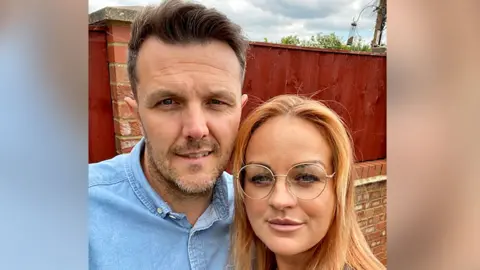 Emma Freeman
Emma FreemanEmma Freeman, 38, from Northamptonshire, was originally due to marry her fiance Paul Chisholm last July. They have postponed it twice more since then and now hope to hold their wedding at the fourth time of asking in November.
She said on Tuesday evening when England beat Germany she was out for dinner with her father as it was the day before her birthday and they could hear football fans singing in a neighbouring pub and then saw them dancing in the street outside - while knowing that were she to be getting married now neither singing nor dancing would be allowed.
"I'm really excited for the football and I love that people have got something to get behind. But it's so inconsistent," she says.
"You go to Wembley and you know the person you have gone with. The chances are the other thousands of people you come into contact with are strangers. You are taking a gamble. When a goal is scored you might hug a stranger.
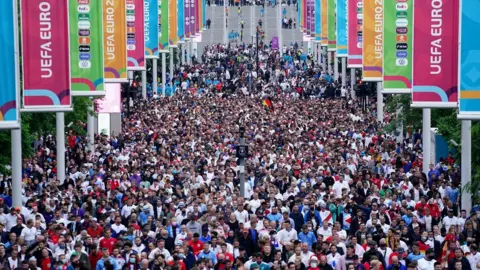 PA Media
PA Media"I know every single one of my wedding guests. I know who's been vaccinated because it's something we talk about. I know everyone's addresses so everyone could be traced. People have said they would be willing to take a lateral flow test. Some who don't work have said they can isolate before the wedding.
"So why are there more restrictions for weddings? Why is it different for us?
"We are making sure people at our wedding are safe, there are strict protocols, and it feels cruel when you see what's going on elsewhere.
"Is Covid a magnet for weddings?"
Emma makes the point that marriage is, for many people, a once-in-a-lifetime occasion, whereas the Euros is held every four years and so she wonders why weddings - "something that means so much" - appear to be less of a priority.
It is not just football that is allowed big crowds, though. On Sunday 18 July - the day before restrictions could be lifted - Silverstone is due to welcome a crowd of 140,000 for the British Grand Prix as a test event. Formula One world champion Lewis Hamilton has said he thinks "it feels a bit premature" to have a full crowd at the track. And Download Festival was held as a test event two weeks ago with 10,000 attending.
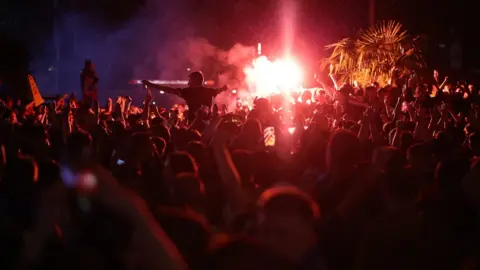 Reuters
ReutersBut the day after England's win over Germany news came from Scotland that nearly 2,000 Covid cases in Scotland have been linked to fans watching Euro 2020 games. Public Health Scotland said two-thirds of the 1,991 cases were people who travelled to London for Scotland's game with England on 18 June.
Fans attending the matches at Wembley have been expected to provide evidence of a negative lateral flow test taken in the 48 hours before the match, or of having been fully vaccinated. But the evidence from Public Health Scotland suggested many of those who tested positive after travelling to London for the match against England had not actually had tickets for the game, and so would not necessarily have been subject to those obligations.
So might we expect to see a rise in cases among people who watched England v Germany - either at the stadium or at the various fan sites or pubs around the country where fans gathered?
BBC health correspondent Nick Triggle says the contact tracing data behind the news of the cases among Scotland fans cannot provide the answer.
"It tells us that 6% of positive cases during this period attended a match, fanzone, someone's home or the pub to watch a game of football," he says. "It does not tell you where the individual caught the virus - just where they had been when they were infectious."
The Department for Culture, Media and Sport (DCMS) pointed out that "on several occasions, the Mayor of London, UK government and Scottish government had urged Scottish fans without tickets not to travel to London ahead of the match between England and Scotland, in light of rising numbers of COVID-19 cases".
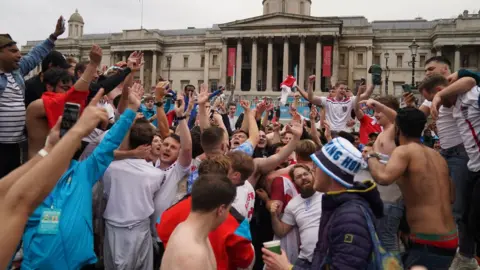 PA Media
PA MediaWedding planner Jessie Westwood is a co-founder of the What About Weddings campaign, which has sought to highlight the issues faced by the wedding industry during the pandemic.
"I think it's got to the stage now where couples are appalled by what they are seeing," she says. "It's not just the football, it's the tennis too - it seems like they are cherry-picking and calling them test events. We did a survey and found 83% of couples are asking their guests to take tests, and that's for weddings - an event with about 100 or so people and it's a much more sober affair - people won't be running around with their shirts off."
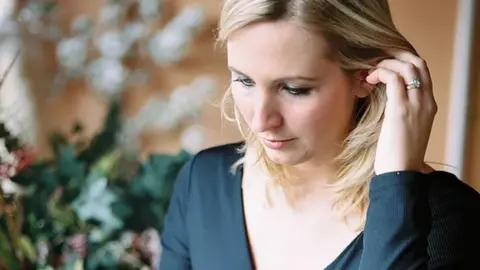 Jessie Westwood
Jessie WestwoodJessie says it is becoming harder for wedding venues to police the guidelines as people attending ceremonies and receptions have seen big crowds at sporting events, but have also watched politicians enjoying the football with a drink and seen leaders at the recent G7 summit in Cornwall gather for a barbecue.
"It does seem like it's one rule for them and one for us," she says. "They must think we're mugs."
She says people are still by and large abiding by the rules, but she points out if frustration over perceived inconsistencies prompts guests to not stick to guidelines then wedding venues and suppliers, who have already faced massive disruption to their livelihoods during the pandemic, can be at risk of being fined.
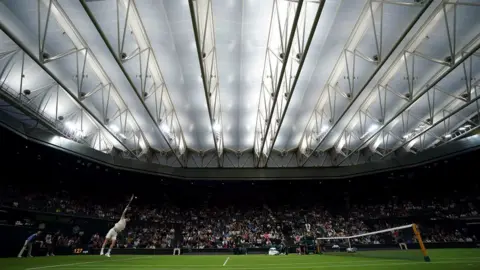 PA Media
PA MediaMike Kill, CEO of the Night Time Industries Association, is another who says he has no issue with sporting events going ahead with crowds as long as other industries are treated fairly. And he says cultural activities do not seem to be getting the same opportunities as sport.
"People are starting to feel a little less inhibited with the success of the vaccine rollout and it's the first opportunity to get excited about something. I completely understand why people are getting excited about the football and the tennis, but when you see Wimbledon closing the roof, you've essentially got an indoor arena for 15,000 people, so you have got to wonder why we are closed?
"If you're a festival operator and you're watching 40,000 people in a stadium, that's not too different to recreating what you see at some of the festivals out there.
"There are 850,000 18-year-olds that haven't been to a club or to a festival or out for freshers' week. These are all experiences that have been taken away from them over the past 18 months."
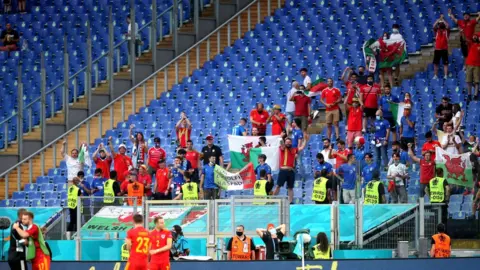 PA Media
PA MediaThe DCMS said: "Public safety is our main priority. We continue to urge all fans to continue to follow the latest public health guidance and enjoy the tournament safely.
"The increase of capacity at Wembley Stadium to 60,000 for the Euro 2020 semi-finals and final will provide the opportunity to assess how we can best mitigate transmission risks and logistical challenges in preparation for fans returning to stadiums and events in greater numbers.
"We will continue to work closely with the local authority director of public health and senior officials in Public Health England and the Department of Health and Social Care to ensure these matches run as safely as possible."
